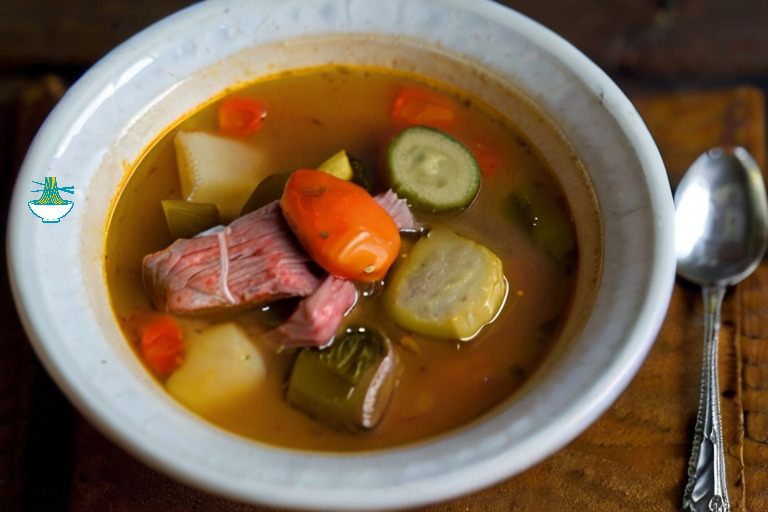Indulge in the rich culinary heritage of Estonia with Seljanka, a soul-warming soup that encapsulates the essence of Eastern European cuisine. This beloved dish is a delightful amalgamation of diverse flavors, textures, and ingredients, showcasing the country's cultural influences. Traditionally prepared with a base of tangy sauerkraut, succulent meats such as beef, pork, or chicken, and an array of vegetables including potatoes, carrots, and bell peppers, each spoonful offers a symphony of savory notes. Infused with aromatic herbs and spices like bay leaves, black pepper, and paprika, Estonian Seljanka boasts a robust and comforting taste that captivates the senses. Whether enjoyed as a hearty meal on a chilly evening or served as a starter to a festive gathering, this rustic soup promises to leave a lasting impression and transport you to the heart of Estonia's culinary tradition.
Here's a recipe for Estonian Seljanka:
Ingredients:
- 300g mixed meats (beef, pork, chicken), diced
- 1 onion, finely chopped
- 2 garlic cloves, minced
- 2 medium potatoes, peeled and diced
- 1 carrot, peeled and diced
- 1 bell pepper, diced
- 1 cup sauerkraut, drained and rinsed
- 2 tomatoes, diced
- 2-3 pickles, diced
- 1 bay leaf
- 1 teaspoon paprika
- 1 teaspoon caraway seeds
- Salt and pepper to taste
- 1 liter beef or vegetable broth
- Sour cream or yogurt, for serving
- Fresh parsley, chopped, for garnish

Instructions:
1- In a large pot, heat some oil over medium heat. Add the diced mixed meats and cook until browned on all sides. Remove the meats from the pot and set aside.
2- In the same pot, add a bit more oil if needed, then add the chopped onion and garlic. Sauté until softened and fragrant.
3- Add the diced potatoes, carrots, bell pepper, sauerkraut, tomatoes, and pickles to the pot. Stir well to combine.
4- Return the browned meats to the pot. Pour in the beef or vegetable broth, ensuring all ingredients are submerged. Add the bay leaf, paprika, caraway seeds, salt, and pepper. Stir to combine.
5- Bring the soup to a boil, then reduce the heat to low. Cover and simmer for about 30-40 minutes, or until the vegetables are tender and the flavors have melded together.
6- Taste and adjust seasoning if necessary.
7- Serve the Seljanka hot, garnished with a dollop of sour cream or yogurt and a sprinkle of chopped fresh parsley.
8- Enjoy your hearty Estonian Seljanka soup with some crusty bread on the side!
This recipe serves approximately 4-6 people. Adjust quantities accordingly based on your preferences and the number of servings needed.
Nutritional Values:
Here's an approximate nutritional breakdown for the main ingredients used in Estonian Seljanka soup, per 100 grams:
Mixed meats (beef, pork, chicken):
- Calories: 250-300 kcal
- Protein: 20-25 grams
- Fat: 15-25 grams
- Carbohydrates: 0 grams
benefits:
- Excellent source of protein, essential for muscle growth and repair.
- Provides essential vitamins and minerals such as iron, zinc, and B vitamins.
Onion:
- Calories: 40 kcal
- Protein: 1 gram
- Fat: 0 grams
- Carbohydrates: 10 grams
- Fiber: 1-2 grams
benefits:
- Rich in antioxidants, particularly flavonoids, which may help reduce the risk of chronic diseases.
- Contains prebiotic fibers that promote gut health and support digestion.
Garlic:
- Calories: 150 kcal
- Protein: 6 grams
- Fat: 0 grams
- Carbohydrates: 33 grams
- Fiber: 2 grams
benefits:
- Contains compounds with potent medicinal properties, including allicin, which may help boost the immune system and reduce the risk of heart disease.
- May have anti-inflammatory and antibacterial effects.
Potatoes:
- Calories: 70 kcal
- Protein: 2 grams
- Fat: 0 grams
- Carbohydrates: 15 grams
- Fiber: 2 grams
benefits:
- Good source of carbohydrates, providing energy for daily activities.
- Rich in vitamin C, potassium, and B vitamins, supporting overall health and immunity.
Carrot:
- Calories: 40 kcal
- Protein: 1 gram
- Fat: 0 grams
- Carbohydrates: 10 grams
- Fiber: 3 grams
benefits:
- High in beta-carotene, a precursor to vitamin A, important for vision, immune function, and skin health.
- Contains antioxidants that may help reduce the risk of certain cancers and promote heart health.
Bell pepper:
- Calories: 30 kcal
- Protein: 1 gram
- Fat: 0 grams
- Carbohydrates: 7 grams
- Fiber: 2 grams
benefits:
- Excellent source of vitamin C, which supports immune function and skin health.
- Provides antioxidants like beta-carotene and quercetin, which have anti-inflammatory properties.
Sauerkraut:
- Calories: 20 kcal
- Protein: 1 gram
- Fat: 0 grams
- Carbohydrates: 5 grams
- Fiber: 2 grams
benefits:
- Contains probiotics, beneficial bacteria that support gut health and digestion.
- Rich in vitamin C and fiber, promoting a healthy immune system and regular bowel movements.
Tomatoes:
- Calories: 20 kcal
- Protein: 1 gram
- Fat: 0 grams
- Carbohydrates: 5 grams
- Fiber: 1 gram
benefits:
- High in lycopene, an antioxidant linked to reduced risk of heart disease and certain cancers.
- Good source of vitamins A, C, and K, as well as potassium and folate.
Pickles:
- Calories: 10 kcal
- Protein: 0 grams
- Fat: 0 grams
- Carbohydrates: 3 grams
- Fiber: 1 gram
benefits:
- Low in calories and fat, making them a healthy snack option.
- Contains probiotics if fermented, supporting gut health and digestion.
Sour cream:
- Calories: 200 kcal
- Protein: 2-3 grams
- Fat: 20 grams
- Carbohydrates: 4 grams
benefits:
- Good source of calcium and phosphorus, essential for bone health.
- Provides probiotics if made from fermented dairy, promoting gut health and digestion.
Please note that these values are approximate and can vary based on factors such as cooking methods, specific brands/products used, and ingredient proportions in the recipe.


Comments